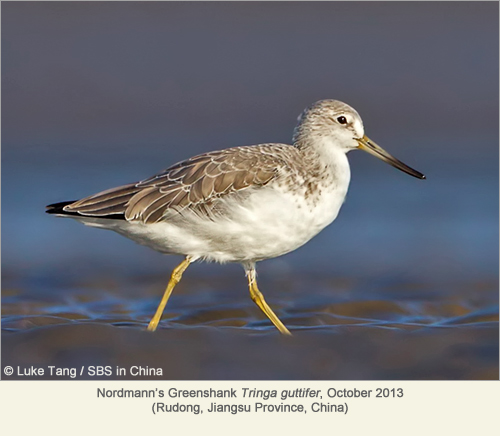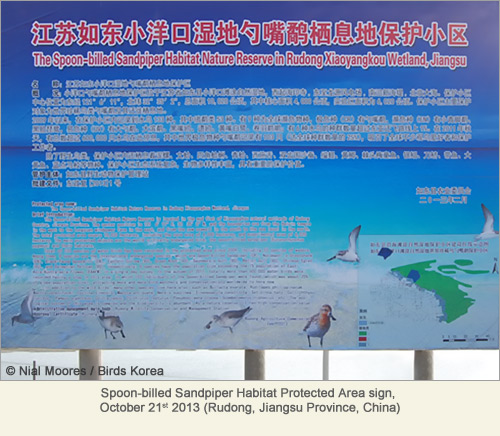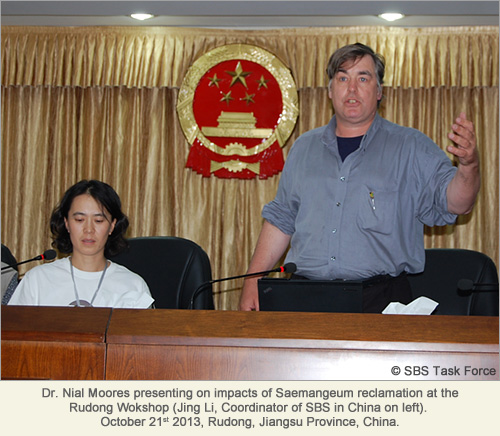Migratory Bird Species Recognised
Recent survey of the Chinese coastline by the conservation network ‘SBS in China’ supported by 15 waterbird experts from the international Spoon-billed Sandpiper (SBS) Task Force(1), including the Korean NGO Birds Korea(2), confirms the outstanding international importance of intertidal wetlands in Jiangsu Province.
The survey was conducted from October 15th-19th along 120km of coastline near Rudong, Jiangsu Province, China. At least 140 Spoon-billed Sandpiper, 1200 Nordmann’s Greenshank and ‘internationally important concentrations’ of several other waterbird species as defined by the intergovernmental Ramsar Convention on wetlands(3) were recorded.
Once found in flocks of hundreds in the Nakdong Estuary and in large numbers at Saemangeum, the fast-declining and Critically Endangered Spoon-billed Sandpiper(4) now has an estimated world population of only 300 individuals, making it one of the world’s rarest migratory bird species. The 140 recorded during this survey is the highest number seen anywhere in the world since 185 were counted in Saemangeum in 1999, before seawall closure there. The survey also made the largest ever count of the globally Endangered Nordmann’s Greenshank. Both species depend on the most naturally-productive and healthy intertidal wetlands, during migration especially in the Yellow Sea.
Many of the most important intertidal wetlands along the Jiangsu coast are still threatened by continuing reclamation for agricultural and industrial development. However, local and provincial authorities now recognise the international importance of the area and this month designated a protected area in Rudong for Spoon-billed Sandpiper, along with additional areas to conserve shellfish stocks.
Stated Jing Li (Coordinator of SBS in China), “Our surveys confirm the intertidal wetlands of Rudong as the most important remaining stopover site for the Spoon-billed Sandpiper during its entire 8000km long migration route. Protecting these remaining internationally important intertidal wetlands is vital for the sandpiper’s survival, and also for the maintenance of the shellfishery and other vital services provided by tidal-flats. We urgently need more conservation action in China and elsewhere in the Yellow Sea to prevent this and other tidal-flat species from going extinct.”
“We now believe the entire world population of the adults of both Spoon-billed Sandpiper and Nordmannn’s Greenshank are staging at the highly productive intertidal flats on the coast of Rudong” added Dr Nigel Clark from BTO in the UK.
The survey was followed by a two-day workshop(5) hosted by the Rudong government. Workshop participants were encouraged by the commitment of local and provincial government to stop illegal hunting along the coast and to designate a protected area for the Spoon-billed Sandpiper.
“This is a historic moment in the conservation of the species” stated Dr Christoph Zöckler of the SBS Task Force. Prof. Chang Qing, of Nanjing Normal University added: “We now hope to create a working group of local government and NGOs that involves all stakeholders in the future planning of wetland reserves and their management.”
In conclusion, Dr. Nial Moores (Director, Birds Korea) stated: “The Spoon-billed Sandpiper is Korea’s rarest migratory bird species. Reclamation at Saemangeum and along the coast has resulted in a massive population decline of the Spoon-billed Sandpiper and many other species. Their declines signal the loss of our nation’s most important tidal-flats – along with important fisheries and other ecological services. This year we counted only 20 or so Spoon-billed Sandpiper nationwide in Korea(6). The survey in Jiangsu shows that most of these fly from Korea to China as part of their migration. There is an urgent need, as called for by international conventions and agreements, to conserve the Yellow Sea’s remaining tidal-flats. We need tidal-flat restoration not reclamation. If not, the charismatic Spoon-billed Sandpiper will soon become extinct”.
Contact:| Jing Li | SBS in China | sbsinchina@gmail.com |
| Dr. Christoph Zöckler | SBS Task Force Coordinator | cz@arccona.com |
| Kim Minseon | EAAFP Program Officer | min-seon.kim@eaaflyway.net |
| Dr. Nial Moores | Birds Korea (SBS Task Force NGO member in ROK) (English language) | Nial.Moores@birdskorea.org |
| Park Meena | Birds Korea (SBS Task Force NGO member in ROK) (Korean language) | Park.Meena@birdskorea.org |
Notes to editors
| (1) | The international Spoon-billed Sandpiper Task Force is set up under the East Asian-Australasian Flyway Partnership to implement conservation measures to reverse the declines in the Critically Endangered Spoon-billed Sandpiper, a small sandpiper with a uniquely shaped bill that nests in the Russian Arctic, and migrates through Eastern Asia to winter in Southern and SE Asia http://www.eaaflyway.net/spoon-billed-sandpiper.php Experts in the survey team came from the Republic of Korea, Russia, Japan, Myanmar, the UK and the US. |
| (2) | Birds Korea is a legally-registered Korean NGO with an office in Busan. Birds Korea has been the SBS Task Force NGO member for the Republic of Korea since 2006. http://www.birdskorea.or.kr http://www.birdskorea.org |
| (3) | The intergovernmental Ramsar Convention on Wetlands: http://www.ramsar.org Ramsar criteria for identifying internationally important wetlands: http://www.ramsar.org/cda/en/ramsar-about-sites-criteria-for/main/ramsar/ 1-36-55%5E20740_4000_0__ |
| (4) | Critically Endangered: a Species “Facing an extremely high risk of extinction in the wild in the immediate future” (IUCN (2013): http://www.iucnredlist.org/static/categories_criteria_2_3 |
| (5) | The survey and workshop was generously funded by the US Fish and Wildlife Service and the German Manfred Hermsen Foundation as well as supported with donations collected at the Helgoland Bird Days in 2012. The workshop held immediately after the survey on 20-21 October in Rudong, was co-hosted with the Wildlife Conservation Society of the Jiangsu Province, and the Nantong and Rudong local governments. |
| (6) | Between August-October 2013, Spoon-billed Sandpipers were recorded in the ROK at: Song Do, Incheon (1); Geum Estuary (12- 15); within Saemangeum reclamation area (4); and at the Nakdong Estuary (3). |
Birds Korea 1108 Ho, 3 Dong, Samick Tower Apt., 148-22, Namcheon-Dong, Su-Young-Gu
Busan, 618-762 Republic of Korea











